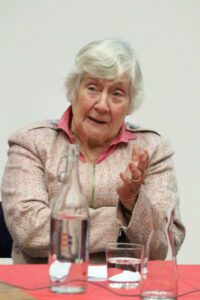
Women Who Overcame – Shirley Williams
Meet Shirley Williams MP – A tenacious advocate of change in British Society and its political system, which has had a lasting effect even today.
Early Life and Influences

Shirley Vivian Teresa Brittain Catlin, born on July 27, 1930, became a prominent figure in British politics. Her life drew deep influence from her family’s experiences and the upheavals of the 20th century. Her mother, Vera Brittain, a renowned feminist writer, vividly portrayed the war’s toll on her family in her memoir Testament of Youth.
During the First World War, Vera Brittain volunteered as a nurse, enduring profound personal loss. She served in a government hospital in London in 1915, then in Malta, and later in France, where German forces overran her hospital.
Family Tragedy During Wartime
This period saw immense casualties, including those close to the Brittain family. Vera’s fiancé, Roland Leighton, died in 1915, and her brother, Edward Brittain, was killed in action in April 1917. Another close friend, Victor Richardson, was blinded in April 1917 and died from a cerebral abscess in June 1917. Shirley Williams spoke of her pride in her mother’s wartime nursing service and her frankness about the experiences, which taught Williams about the horrors of European conflict and instilled in her a lifelong commitment to peace.
Shirley Williams’s Political Evolution
Her political journey saw her evolve from a Labour MP to a key figure in changing the balance of parties in the British parliamentary system. She became disillusioned with the direction of the Labour Party in the late 1970s, particularly its move to the left and what she perceived as the shortcomings of the trade unions. In 1980, she, along with other senior Labour MPs David Owen and Bill Rodgers, publicly stated that the party faced “the gravest crisis in its history.”
The Formation of the Social Democratic Party
Shirley Williams helped found the Social Democratic Party (SDP) in 1981 alongside the “Gang of Four” – Roy Jenkins, David Owen, and Bill Rodgers. This new centre-left party aimed to offer a credible alternative to the Labour Party’s perceived dogmatism and Thatcherism. Williams won the SDP’s first parliamentary seat in a sensational Crosby by-election in November 1981, overturning a significant Conservative majority. Her victory reshaped the political landscape and drew strong public support for the SDP and its alliance with the Liberal Party.
Legacy and Later Years
As President of the SDP, Williams actively supported the party’s eventual merger with the Liberal Party in 1988, which led to the formation of the Liberal Democrats. Despite internal disagreements within the SDP over the merger, her commitment to creating a realigned, more centrist political force remained unwavering.
Shirley Williams continued to be an influential voice within the Liberal Democrats, notably serving as their leader in the House of Lords from 2001 to 2004. Furthermore, she remained active in politics until her retirement in 2016. In 2021, she passed away at the age of 90. Nevertheless, her lifetime efforts had already left a lasting mark, significantly contributing to the shift toward the multi-party political landscape seen in Britain today, as opposed to the previously polarised and entrenched two-party system.
Love, Jean




